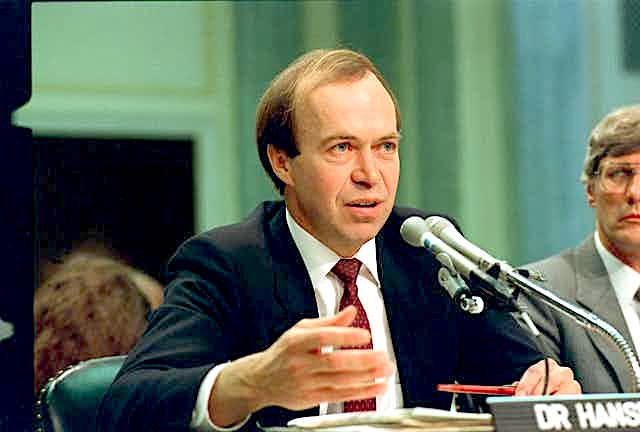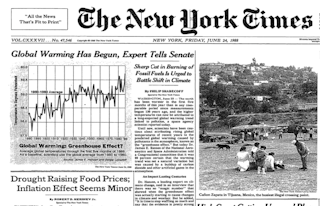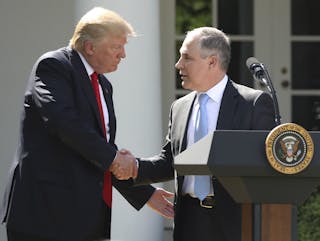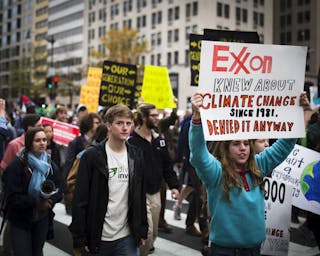At the time, both Republicans and Democrats took it seriously, writes Robert Brulle.

James Hansen testified to Congress in 1988 that warming was caused by pollution and that “it is time to stop waffling so much.” (AP, Dennis Cook)
By Robert Brulle
The Conversation
[This article was first published in 2018]
June 23, 1988 marked the date on which climate change became a national issue. In landmark testimony before the U.S. Senate Energy and Natural Resources Committee, Dr. James Hansen, then director of NASA’s Institute for Space Studies, stated that “Global warming has reached a level such that we can ascribe with a high degree of confidence a cause-and-effect relationship between the greenhouse effect and observed warming…In my opinion, the greenhouse effect has been detected, and it is changing our climate now.”

Hansen’s testimony made clear the threats posed by climate change and attributed the phenomenon to human exploitation of carbon energy sources. Its impact was dramatic, capturing headlines in The New York Times and other major newspapers. As politicians, corporations and environmental organizations acknowledged and began to address this issue, climate change entered into the political arena in a largely nonpartisan fashion.
Yet despite decades of public education on climate change and international negotiations to address it, progress continues to stall. Why?
One reason for the political inaction is the gaping divide in public opinion that resulted from a deliberate – and still controversial – misinformation campaign to redirect the public discussion on climate change in the years following Hansen’s testimony.
As Predicted
Four years after Hansen testified to Congress, 165 nations signed an international treaty, the United Nations Framework Convention on Climate Change. They committed themselves to reducing carbon emissions to avoid dangerous disruption of the Earth’s climate system, defined as limiting future temperature increases to 2 degrees Celsius. The signatories have now held 25 annual UNFCCC conferences dedicated to developing goals, timetables and methods for mitigating climate change, the most consequential of which are encompassed in the Paris Agreement of 2015.
[The nonprofit Climate Action Tracker in September 2021 rated the plans of the U.S. to achieve the Paris goals — along with those of some other northern industrial countries — highly insufficient.]

Former President Donald Trump, left, advised by EPA Administrator Scott Pruitt, on right, pulled the U.S. out of the international Paris Agreement on Climate Change, marking the dramatic shift away from one-time Republican support for action on global warming. (AP, Andrew Harnik)
In the three decades since Dr. Hansen’s testimony, the scientific certainty about the human causes and catastrophic effects of climate change on the biosphere and social systems has only grown stronger. This has been documented in five Intergovernmental Panel on Climate Change assessment reports, three U.S. National Climate Assessments and thousands of peer-reviewed papers.
Yet CO2 levels continue to rise. In 1988, atmospheric CO2 levels stood at 353 parts per million, or ppm, the way to measure the concentration of CO2 molecules in the atmosphere. [By September 2021 it was 413.30 ppm, according to NOAA’s monitoring.]
The effects of these increased concentrations are just as Hansen and others predicted, from disastrous wildfires in the western U.S. and massive hurricanes associated with historical flooding to extended droughts, rising sea levels, increasing ocean acidification, the pervasive spread of tropical diseases and the bleaching and death of coral reefs.
Massive Gap on Public Opinion
Future generations will look back on our tepid response to global climate disruption and wonder why the world did not act sooner and more aggressively.
One answer can be found in the polarization of public opinion over climate change in the United States. A [March 2018] Gallup Poll shows that concern about climate change now falls along partisan lines, with 91 percent of Democrats saying they are worried a great deal or fair amount about climate change, while only 33 percent of Republicans saying the same.
Clearly, a massive gap between Republicans and Democrats has emerged regarding the nature and seriousness of climate change. This partisan divide has led to an extreme political conflict over the need for climate action and helps to explain Congress’s failure to pass meaningful legislation to reduce carbon emissions.
Polarizing Public Opinion
The current political stalemate is no accident. Rather, it is the result of a well-financed and sustained campaign by vested interests to develop and promulgate misinformation about climate science.
My scholarship documents the coordinated efforts of conservative foundations and fossil fuel corporations to promote uncertainty about the existence and causes of climate change and thus reduce public concern over the issue. Amplified by conservative media, this campaign has significantly altered the nature of the public debate.
These findings are supported by recent investigative news reports showing that since the 1970s, top executives in the fossil fuel industry have been well aware of the evidence that their products amplify climate warming emissions. Indeed, industry scientists had conducted their own extensive research on the topic and participated in contemporaneous scientific discussions.
The American Petroleum Institute, an industry trade group, even circulated these research results to its members. By 1978, a senior executive at ExxonMobil had proposed creating a worldwide “CO2 in the Atmosphere” research and development program to determine an appropriate response to growing evidence of climate change.

Investigative reports brought to light the extent of Exxon’s research into global warming even though the company later funded public relations campaigns to sow doubt about climate change. (Johnny Silvercloud)
Unfortunately, that path wasn’t taken. Instead, in 1989, a group of fossil fuel corporations, utilities and automobile manufacturers banded together to form the Global Climate Coalition. The group was convened to prevent the U.S. adoption of the Kyoto Protocol, an international agreement to limit greenhouse gas emissions. In its public statements, the coalition’s official position was to claim global warming was real but that it could be part of a natural warming trend.
The corporate drive to spread climate misinformation continued beyond fighting Kyoto. In 1998, API, Exxon, Chevron, Southern Co. and various conservative think tanks initiated a broad public relations campaign with a goal of ensuring that the “recognition of uncertainties of climate science becomes part of the ‘conventional wisdom.’”
While that coalition disbanded in 2001, ExxonMobil reportedly continued to quietly fund climate misinformation, funneling donations through conservative, “skeptic” think tanks such as the Heartland Institute, until 2006, when the nonprofit Union of Concerned Scientists exposed its funding scheme.
[Related: The Climate Change Lawsuits Against Big Oil, Feb. 2, 2021]
The central concern here is nothing less than the moral integrity of the public sphere. The Declaration of Independence states that governments “derive their just powers from the consent of the governed.” But when vested interests with outsize economic and cultural power distort the public debate by introducing falsehoods, the integrity of Americans’ deliberations is compromised.
Robert Brulle is a professor of sociology and environmental science in the Department of Sociology and an affiliate Professor of Public Heath in the School of Public Health at Drexel University in Philadelphia.
This article is republished from The Conversation under a Creative Commons license. Read the original article.

I cannot decide what is most pernicious about the United States: the corporate fascism that has dominated its entire history or its elitist liberalism that likes to believe the US is a wonderful nation that has gone astray of late and can be fixed.
I recall hearing Dr. Hansen addressing congress driving down the road on the radio 30 years ago, my thoughts were it’s really happening.
I initially heard about climate change in college physics in the 70s, and knew this is serious.
The USA likes to pretend it is democratic.
Now as then…money reigns supreme. The one and only advantage of the rich: more luxurious caskets.